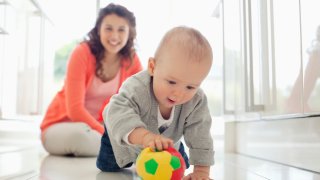
If your kids racked up new toys this holiday season, now might be the best time to throw away their old ones—especially if you stop to consider just how many germs they may carry.
Cinch Home Services, a home warranty company, swabbed popular toys of all different kinds and discovered that most of them carry substantial amounts of germs, particularly in comparison to other household objects.
WATCH ANYTIME FOR FREE
>Stream NBC10 Boston news for free, 24/7, wherever you are. |
For the analysis, colony-forming units (CFUs) were used as a measurement for the amount of germs on the surfaces of toys like building blocks and slime. In this instance, a CFU is a unit that represents a group of bacterial or fungal cells that are multiplying together. Though, it's important to note that statistical testing was not conducted during the analysis.
When Cinch Home Services polled 1,000 U.S. adults, they found that "roughly 1 in 10 American parents do not believe it's necessary to sanitize their children's toys."
Get updates on what's happening in Boston to your inbox. Sign up for our >News Headlines newsletter.
The data suggests that those parents, and many others, could be exposing their children to the same amount, or more, germs than household surfaces like toilet seats and kitchen sinks.
8 toys you should clean regularly or toss
Here are eight toys you should consider sanitizing or just throwing away, and how many germs were detected on a single toy (or set, if indicated):
- Building block set: 31 million CFUs – equal to 13 times the bacteria of a toothbrush holder
- Slime: 30 million CFUs – 3 times the amount of bacteria in a kitchen sink
- Doll: 13 million CFUs – 9 times more bacteria than a pet's food bowl
- Small toy car: 40,000 CFUs – about 2 times the bacteria of a bathroom faucet handle
- Gaming controller: 34,000 CFUs – Double the bacteria of a pet's toy ball
- Toy kitchen set: 17,000 CFUs – 4 times the bacteria of a countertop
- Rubber ball: 1,400 CFUs – 3 times more bacteria than a toilet seat
- Stuffed animal: 70 CFUs – about 2 times more bacteria than a wallet
A little over a tenth of those polled say they clean their children's toys biweekly or less. But, some parents choose to clean their child's toys weekly (42%), while others opt for a daily clean of the germ-ridden objects (44%).
Money Report
No matter where you fall on the list, it's clear that given the amount of germs toys can carry, you should think about sanitizing or tossing them when necessary.
"While kids are known to be bundles of germs, you should still reduce their chances of coming into contact with viruses and diseases to keep them from getting sick," the company says.
"A little bleach, vinegar or soap once in a while can go a long way in protecting your family's health."
Sign up now: Get smarter about your money and career with our weekly newsletter
Don't miss:
- Spending more time with your kids, grandkids—and their germs—may lower risk of a severe outcome from Covid-19, recent studies show
- Here’s how much money it takes to be considered middle class in 20 major U.S. cities






